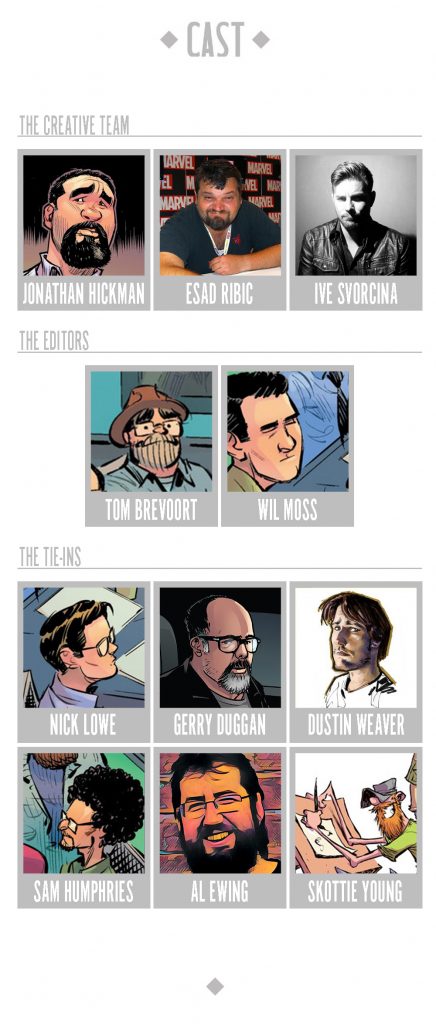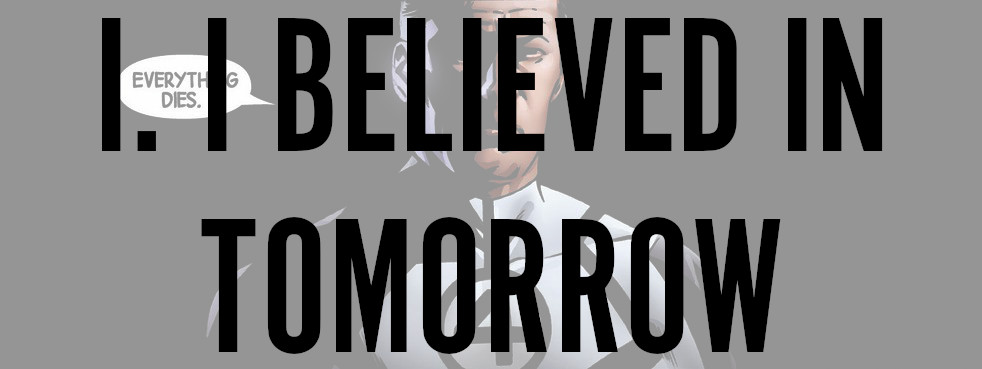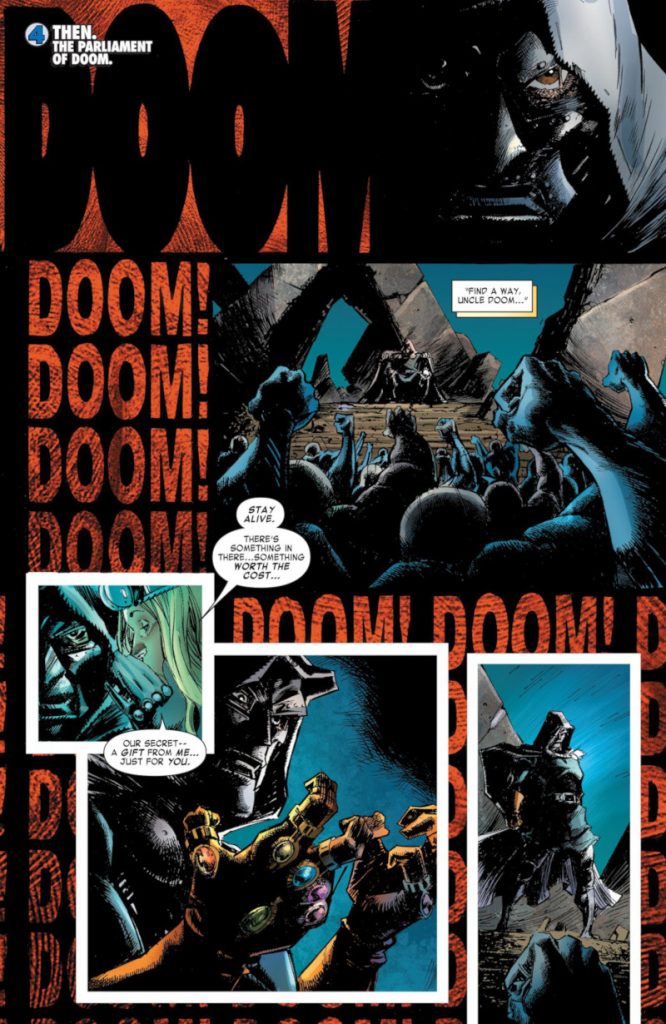Solve Everything: An Oral History of 2015’s Secret Wars and How It Came to Be
Event comics are designed to change the superhero universe they belong to. That’s their fundamental nature, acting as crescendos to recent, notable storylines. They’re also meant to sell comics, of course, but this usually feeds from that same transformative nature. “This story will change everything,” the marketing for each of these titles tells us, again and again.
The problem is this doesn’t always happen. Many events are just big stories with enough oomph to warrant a more significant focus – or even arcs elevated in hopes of goosing orders – rather than something with actual line-wide significance. The rarity of a true universe-changing event, though, can mean that when they do arrive, they have an outsized impact.
One of those – maybe even the biggest of them all – was 2015’s Secret Wars. This nine-part mini-series from writer Jonathan Hickman, artist Esad Ribić, colorist Ive Svorcina, and letterers Chris Eliopoulos and Clayton Cowles was the culmination of not just Hickman’s preceding Avengers and New Avengers run, but arguably the totality of his time at Marvel up until that point. 39 It told the story of Doctor Doom’s reign as a god on a newly remade Battleworld – built from Incursion points of other, destroyed Earths and filled with new versions of old favorites – as Reed Richards, Black Panther, Namor, and a small group of heroes (and villains) who still remembered what once was endeavored to end Doom’s reign and return the Earth to its rightful state.
It was a monster of a series, resulting in the temporary ending of Marvel’s entire line, the destruction of the Ultimate Universe, the migration of Miles Morales (and others) to Marvel’s primary 616 universe, the sunsetting of the bulk of the Fantastic Four for more than two and a half years, and an array of story points that continue onwards in Marvel stories to this day. It wasn’t just a big deal in theory either. It sold like gangbusters and had a deep impact on the Marvel Cinematic Universe, particularly Avengers: Infinity War and Avengers: Endgame. In short?
Secret Wars changed everything.
This is its story.


The story behind Secret Wars begins at a creative pinnacle for the publisher, when it was a “murderer’s row of fantastic talent,” per Hickman. 40 He was newer to the publisher, in the midst of Secret Warriors and in the process of developing S.H.I.E.L.D.. The writer viewed himself as the guy who was “hitting doubles” at a publisher that was “only doing home runs” at the time. 41
Jonathan Hickman (writer of Secret Wars, Avengers and New Avengers): I specifically remember the first time that Tom (Brevoort, his editor) and I ever uttered the words “Secret Wars.” He called me and I stopped the car and I was in a parking lot, like at the mall, and we were talking about what I could do going forward. I was trying to find a nook and cranny to fit inside of. And I told him, “I want to do Strikeforce: Morituri meets Exiles. That’s what I want to do. I want to do this book where everybody dies every issue, but each issue takes place in a different reality.” (laughs) 42
Tom Brevoort (editor of Secret Wars, Avengers and New Avengers): The event wasn’t the event at first. Secret Wars was an idea Jonathan had for a book, and it was relatively early.
Hickman: It’s a cool idea, right? But, where the hell does that fit in the Marvel publishing line? And that was what Tom’s response was. “I don’t know how we sell that book.” And I was like, “Well, we have to wrap it up in a high concept thing, and I don’t know, call it Secret Wars or something like that.” 43
Brevoort: He pitched me this idea of doing a book that would be called Secret Wars that would effectively be the book that New Avengers was. It would be the Illuminati, and they’d be dealing with these universal Incursions and having these battles and conflicts with these alternate worlds on a regular basis, and that would be the series.
Hickman: Tom was like, “That’s not a bad idea.” I remember at that point, I was like, “that’s not a bad idea.” And so, it just kind of grew out of that in the back of my head.
Shortly thereafter, Hickman found his corner with his acclaimed Fantastic Four run. But the Secret Wars idea was still there, lingering as something that might happen someday.
Brevoort: (Secret Wars) was something on the backburner as things developed. And he planted certain seeds in the Fantastic Four run to set that up.

Hickman: I started angling toward it and then, sometime in the Fantastic Four bits of it, I was like, “alright, I’m building towards a thing.” But it came out of a bizarro Exiles, Strikeforce: Morituri pitch. (laughs)
Brevoort: Almost nobody knows this, but the last issue of his Fantastic Four run 44 would have been the inciting incident to Secret Wars had it not happened in Avengers.
Hickman: It would have been inverted. 45 It would have been a Parliament of Doom story. The whole next chunk of Fantastic Four, if I would’ve stayed on that book, would have been a Rabum Alal and Doom, huge mythology story. It was just the other side of it. And then you would have realized that it was our Illuminati and our Earth.
Brevoort: That story was all about (how) Doom had been knocked into a universe, and he took over the universe. Reed and Nathaniel ended up there and they have a conflict with him, and by the end, that universe is destroyed. And theoretically, had things progressed from there, that would have been the inciting incident that began the Incursions happening.
Hickman: I had pieces of all of that inside the Fantastic Four machine that I built.
That changed as Avengers vs. X-Men was coming together and the powers that be decided it might be a good time to mix things up.
Hickman: That all happened because at a retreat one time, everybody was like, “Do we want to switch it up and everybody swaps books and redo the whole line?” I was one of the first people that was, “Yeah. Fuck it. If I’ve got to jump off Fantastic Four and do something else, that’s cool.” I didn’t know it was going to be Avengers.
Brevoort: When I presented that to him, he basically said to me, “Oh yeah, we can do that. I could come off of Fantastic Four and I’ll just do my Secret Wars book. We’ll just do it as New Avengers.” And that’s what we ended up doing.
Hickman: I like chaos and change and working in that kind of environment. I think it’s very conducive of interesting work.
subscribers only.
Learn more about what you get with a subscription
The series factored in beats from almost every title the writer had worked on previously, most notably the Avengers books, Fantastic Four, and Ultimates.↩
This included peak of their powers Brian Michael Bendis, Matt Fraction, Ed Brubaker, Jason Aaron, Jeph Loeb, Dan Abnett + Andy Lanning, and more, and that’s just the writers.↩
In case you’re not a baseball fan, that Hickman line means he was perceived as good at a time when the baseline was greatness.↩
Quick note: these interviews have been edited for clarity and length.↩
While the original 1984 Secret Wars event was the inspiration for the name of the series and where the bulk of the story took place, that’s the extent of its impact, at least based off the conversations I had.↩
#611.↩
He’s talking about the story that played out in New Avengers, which is a wonderfully fun mental exercise to think about.↩
The series factored in beats from almost every title the writer had worked on previously, most notably the Avengers books, Fantastic Four, and Ultimates.↩
This included peak of their powers Brian Michael Bendis, Matt Fraction, Ed Brubaker, Jason Aaron, Jeph Loeb, Dan Abnett + Andy Lanning, and more, and that’s just the writers.↩
In case you’re not a baseball fan, that Hickman line means he was perceived as good at a time when the baseline was greatness.↩
Quick note: these interviews have been edited for clarity and length.↩
While the original 1984 Secret Wars event was the inspiration for the name of the series and where the bulk of the story took place, that’s the extent of its impact, at least based off the conversations I had.↩
#611.↩
He’s talking about the story that played out in New Avengers, which is a wonderfully fun mental exercise to think about.↩
Where he first met and worked with Secret Wars artist Esad Ribić.↩
Including a primary cast of Reed Richards, Black Panther, Namor, Iron Man, Doctor Strange, Black Bolt, and Beast.↩
When he helmed the Guardians of the Galaxy/X-Men event The Black Vortex.↩
Hickman mentioned his frustration of not getting there fast enough to migrate Ultimate Nick Fury over to the 616 before Marvel’s Nick Fury Jr. move. Understandable! That would have been much cleaner.↩
Quick note about the gravestone-like image to the left that Secret Wars #1 concluded with. That was Brevoort’s idea, as he thought it’d be a good indicator to readers that this wasn’t an ordinary event. He was correct!↩
In Secret Wars.↩
Hickman was the only one who noted this, and he shared that while he understood fans being upset, he also said it would be “really difficult for any honest person to say that Marvel did the wrong thing there when they won” in regards to how the rights eventually played out.↩
Lowe emphasized that while most people outside the company believe that tying in is mandatory, tie-ins aren’t required “with very rare exceptions.”↩
There were three varieties – Last Days, Warzones, and Battleworld – each of which had slightly different flavors.↩
Meaning issue #2.↩
In Secret Wars #2.↩
Duggan shared a story about James Robinson leaning over during the meeting to drop an important suggestion for the story, with the writer saying, “Clint Barton was raised by a First Nations family, and he had scarlet fever and lost his hearing.” Just like that, Duggan had another angle. That was what the whole retreat was like.↩
Gillen, the writer of the Siege tie-in series.↩
Everyone agreed someone from the Guardians needed to be included as their movie had just been released in blockbuster fashion.↩
That’s The Maker, whose heel turn was depicted in Bendis and Rafa Sandoval’s Ultimate Comics: Doomsday trilogy.↩
Reed.↩
This knowledge was important. It also got Strange killed. Whoops!↩
Hickman described this as a “Brian Bendis-ism,” saying, “You want to work with the really good guys. They make you look better than you are.” Esad’s a great pick for that!↩
More on that in a bit.↩
The good news is they are both based out of Croatia, allowing for in-person collaboration.↩
This included all of Battleworld, which Ribić had to bring to life as almost none of it previously existed. Plus, the artist was able to use tech designs he created for Ultimates, which he was thrilled to do.↩
I want to note here: this may be true, but the strength of Ribić’s work on Secret Wars cannot be understated. It’s world-class art that helped make it look as good as any event ever had. It also makes me wonder what the book would have looked like if Esad was able to unleash Plan A upon us because Plan B was still amazing.↩
That’s obviously not the whole reason, but that stretch between Avengers, New Avengers and Secret Wars was a lot for the scribe.↩
Brevoort noted how he likes it when fans get worked up about story turns, because he knows it means they care and because he knows what’s coming next. That definitely happened here.↩
The series factored in beats from almost every title the writer had worked on previously, most notably the Avengers books, Fantastic Four, and Ultimates.↩
This included peak of their powers Brian Michael Bendis, Matt Fraction, Ed Brubaker, Jason Aaron, Jeph Loeb, Dan Abnett + Andy Lanning, and more, and that’s just the writers.↩
In case you’re not a baseball fan, that Hickman line means he was perceived as good at a time when the baseline was greatness.↩
Quick note: these interviews have been edited for clarity and length.↩
While the original 1984 Secret Wars event was the inspiration for the name of the series and where the bulk of the story took place, that’s the extent of its impact, at least based off the conversations I had.↩
#611.↩
He’s talking about the story that played out in New Avengers, which is a wonderfully fun mental exercise to think about.↩
